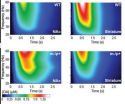(Press-News.org) It is often assumed that those on low incomes and with low levels of education are overly represented in the major increase in obesity of recent decades.
A new thesis from the Lund University School of Economics and Management, Sweden, shows that obesity is increasing across all social groups and that we need to look at factors other than socioeconomic status to understand and solve one of the major public health concerns of the Western world.
Åsa Ljungvall, a researcher in economics at the Lund University School of Economics and Management, has studied the increase in numbers of people who are overweight or obese over recent decades in Sweden and the US.
"My studies show that the increase in the problem of obesity is taking place across a broad front in all socioeconomic groups. So even if there are differences between different levels of education and income, people are affected fairly evenly by the increase – sometimes even in ways that reduce inequality between the groups.
The obesity epidemic is taking place independently of socioeconomic status and affects people more equally than we have previously thought", says Åsa Ljungvall.
Even if the average waist measurement of a Swede is less than that of an average American, Åsa Ljungvall's comparative studies indicate similarities.
"We are seeing the same tendency in Sweden as in the US, where the increases in obesity, severe obesity and BMI since 1960 are very similar for groups with different levels of education and income."
"As we are seeing major increases in all socioeconomic groups, it is perhaps not related to the fact that we don't know any better or cannot afford to do otherwise. There is something else that affects our behaviour more."
So why have we become larger and what can be done about the problem? In Åsa Ljungvall's view, we need to look at something other than socioeconomic factors like education and income to understand and solve one of the major public health problems of the Western world.
It is important to keep the distribution of the problem in mind when discussing causes and possible solutions.
At the same time as the major rise in obesity, we have experienced rapid economic and technological development, which is likely to have influenced what choices we make with regard to diet and physical activity.
These changes seem to have entailed difficulties in maintaining a healthy lifestyle and weight.
"How are we affected by factors such as quality and quantity of available food and drink, stress and uncertainty, opportunities for daily exercise, marketing and information?" asks Åsa Ljungvall rhetorically.
"Factors such as these affect how difficult it is for people to make the 'right' choices and create good habits and norms."
###
For more information, please contact:
Åsa Ljungvall, Doctor of Economics at the School of Economics and Management, Lund University. Tel. +46 46 222 86 83 or email Asa.Ljungvall@nek.lu.se
Henrik Killander, Press Officer at the School of Economics and Management, Lund University. Tel. +46 46 222 80 73 or email Henrik.Killander@ehl.lu.se
Obesity epidemic threatens health of all social groups equally
2012-11-12
ELSE PRESS RELEASES FROM THIS DATE:
Smart drug improves survival in older patients with acute myeloid leukemia
2012-11-12
A new study has found Acute Myeloid Leukaemia (AML) patients given a new type of 'smart drug' in addition to chemotherapy treatment are 22 per cent less likely to relapse and around 13 per cent less likely to die from their disease. The results are from a major phase III Cancer Research UK-funded trial led by Cardiff University.
Of the 1,115 patients who took part in the trial, 68 per cent relapsed on the new treatment within three years, compared with 76 per cent of those who had the standard treatment. And 25 per cent were still alive after three years, compared with ...
Place in the sun carries risks for outdoor workers
2012-11-12
Those individuals who work outdoors with resultant sun exposure are at increased risk for non-melanoma skin cancers, such as squamous cell carcinoma and basal cell carcinoma. Manigé Fartasch shows that the connection between occupational UV exposure and squamous cell carcinoma is now well-established in her review article in issue 43 of Deutsches Ärzteblatt International (Dtsch Arztebl Int 2012; 109(43): 715−20).
The results are less clear for basal cell carcinoma, another form of non-melanoma skin cancer. Skin cancers caused by UV light have not yet been considered ...
The consequences of late preterm birth
2012-11-12
Delivery at any time before the 39th week of gestation increases the risk of postnatal problems and mortality. A team of authors headed by Christian F. Poets has analyzed mortality and morbidity data from epidemiological studies of infants born between two and six weeks preterm, comparing them with infants born at full term. They present their findings in issue 43 of Deutsches Ärzteblatt International (Dtsch Arztebl Int 2012; 109(43): 721−6).
As a rule, elective Cesarean sections are performed somewhat before full term, in order to prevent spontaneous delivery. However, ...
Ultrasound gel and infections: Researchers propose guidelines to reduce risk
2012-11-12
CHICAGO (November 12, 2012) – In the December issue of Infection Control and Hospital Epidemiology, the journal of the Society for Healthcare Epidemiology of America, guidelines have been proposed by epidemiologists from Beaumont Health System to reduce the risk of infection from contaminated gels. The recommendations are based on the authors' own experiences with an outbreak traced to contaminated ultrasound transmission gel.
In December 2011, researchers uncovered an unusual cluster of Pseudomonas aeruginosa in a cardiovascular surgery intensive care unit during routine ...
Study justifies L-DOPA therapy for Angelman syndrome
2012-11-12
CHAPEL HILL, N.C. – Last year a clinical trial of L-DOPA -- a mainstay of Parkinson's disease therapy -- was launched for Angelman syndrome, a rare intellectual disorder that shares similar motor symptoms such as tremors and difficulty with balance. The clinical trial is based on a 10-year-old case report showing benefit with the drug, but few studies since have explored the neurological justification for using L-DOPA to treat parkinsonian features in Angelman syndrome.
New research from the University of North Carolina School of Medicine, conducted in animal models ...
Patients shy away from asking healthcare workers to wash hands
2012-11-12
CHICAGO (November 12, 2012) – According to a new study published online today, most patients at risk for healthcare-associated infections (HAIs) agree that healthcare workers should be reminded to wash their hands, but little more than half would feel comfortable asking their physicians to wash. The study is published in the December issue of Infection Control and Hospital Epidemiology, the journal of the Society for Healthcare Epidemiology of America. The study points to the need for patient empowerment to improve hand hygiene of healthcare workers.
Researchers from ...
PI3-kinase and PARP inhibitor combo may offer new treatment option for triple-neg breast cancers
2012-11-12
PHILADELPHIA — The simultaneous inhibition of two separate and seemingly unrelated pathways could potentially provide an effective treatment for women with triple-negative breast cancer, according to results of two studies published in the November issue of Cancer Discovery, a journal of the American Association for Cancer Research.
Triple-negative breast cancers do not express three common targets of breast cancer treatments: the estrogen receptor, progesterone receptor and HER2/neu. As a result, women with triple-negative breast cancer have few treatment options. In ...
UNC, Vanderbilt discover a new live vaccine approach for SARS and novel coronaviruses
2012-11-12
Rapid mutation has long been considered a key to viral adaptation to environmental change. But in the case of the coronavirus responsible for deadly severe acute respiratory syndrome (SARS), collaborating researchers at the University of North Carolina and Vanderbilt University have found that accelerating the rate of mutations cripples the virus's ability to cause disease in animals. In addition, they say this finding may allow scientists to explore a new option for creating safer live vaccines.
A collaborative study, published Nov. 11 in Nature Medicine, demonstrates ...
Bringing measuring accuracy to radical treatment
2012-11-12
An international team of scientists working at the Plasma Technology research unit at Ghent University, Belgium, has determined for the first time the absolute density of active substances called radicals found in a state of matter known as plasma, in a study about to be published in EPJ D. These findings could have important implications for medicine—for example, for stimulating tissue regeneration, or to induce a targeted antiseptic effect in vivo without affecting neighbouring tissues.
Qing Xiong and colleagues utilised laser fluorescence spectroscopy (LIF), a detection ...
Duke Medicine news -- Genome sequencing of Burkitt Lymphoma reveals unique mutation
2012-11-12
DURHAM, N.C. – In the first broad genetic landscape mapped of a Burkitt lymphoma tumor, scientists at Duke Medicine and their collaborators identified 70 mutations, including several that had not previously been associated with cancer and a new one that was unique to the disease.
Findings from the genetic sequencing of Burkitt lymphoma, an aggressive form of lymphoma, could be used to develop new drugs or aim existing therapies at mutations known to be susceptible. The researchers published their findings online Sunday, Nov. 11, 2012, in the journal Nature Genetics.
"This ...

